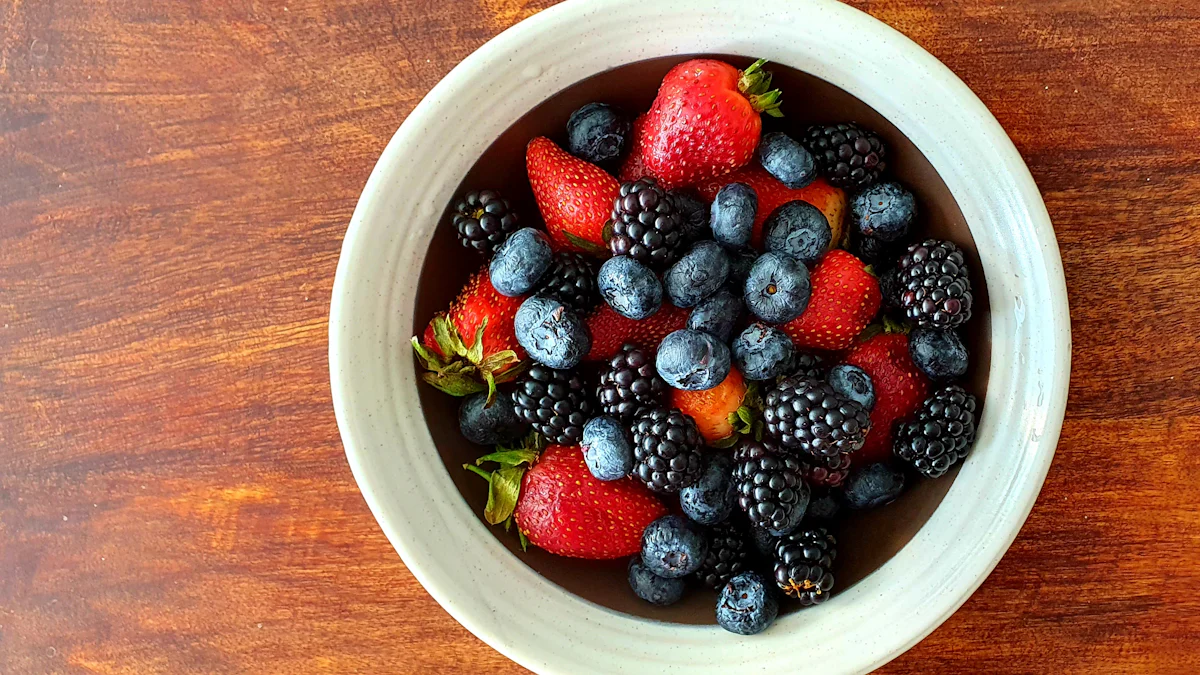10 healthiest foods to eat

Healthy eating transforms lives. Consuming the right foods boosts energy and enhances well-being. A balanced diet reduces risks of heart disease, type 2 diabetes, and certain cancers. Imagine saving $83 to $103 annually on medical costs by simply making healthier choices. Incorporating the healthiest foods into your meals can lead to these benefits. This blog highlights ten specific foods that offer incredible health advantages. Embrace these nutritious options to embark on a journey toward a healthier lifestyle. Start today and witness the positive changes in your life.
Healthiest Foods: Leafy Greens
atOptions = {
'key' : '27100c49111e13847866f33cf71415ff',
'format' : 'iframe',
'height' : 60,
'width' : 468,
'params' : {}
};
src="https://statics.mylandingpages.co/static/aaanxdmf26c522mp/image/77817fdfb93f489e875e6379a46afe97.webp" style="border-style: none; box-sizing: border-box; max-width: 100%;" />
Spinach
Nutritional Benefits
Spinach stands out as one of the healthiest foods. Spinach contains a wealth of nutrients, including vitamins A, C, and K. These vitamins play crucial roles in maintaining your overall health. Spinach also provides fiber, iron, calcium, potassium, magnesium, and vitamin E. These nutrients support various bodily functions and contribute to a balanced diet.
Health Benefits
Spinach offers numerous health benefits. Spinach consumption can aid in weight loss and reduce the risk of diabetes. Spinach helps keep your brain young and href="https://www.medicalnewstoday.com/articles/kale-vs-spinach" style="box-sizing: border-box;">fights off cancer. Spinach href="https://health.clevelandclinic.org/kale-vs-spinach-which-is-heart-healthier" style="box-sizing: border-box;">boosts heart health and eye health. Spinach helps lower blood pressure levels. Spinach's rich fiber and protein content make it a powerhouse for maintaining good health.
Tips for Incorporation
Incorporating spinach into your meals is easy. Add fresh spinach leaves to salads for a nutrient boost. Blend spinach into smoothies for a refreshing and healthy drink. Sauté spinach with garlic for a quick and delicious side dish. Use spinach as a topping on pizzas or in omelets. These simple tips help you enjoy one of the healthiest foods daily.
Kale
Nutritional Benefits
Kale earns its place among the healthiest foods. Kale is rich in vitamins K and C. These vitamins are essential for bone health and immune function. Kale also contains zeaxanthin and lutein, which benefit eye health. Kale's low-calorie content makes it an excellent choice for those watching their weight.
Health Benefits
Kale provides numerous health advantages. Kale excels in heart-healthy flavonoids. Kale supports cardiovascular health. Kale's high fiber content aids digestion and promotes a feeling of fullness. Kale's antioxidants help protect against chronic diseases. Kale contributes to overall well-being.
Tips for Incorporation
Adding kale to your diet can be simple and enjoyable. Toss kale into soups and stews for added nutrition. Bake kale chips for a crunchy and healthy snack. Mix kale into pasta dishes for a vibrant and nutritious meal. Blend kale into green juices for a refreshing beverage. These ideas make it easy to include one of the healthiest foods in your routine.
Healthiest Foods: Berries

Blueberries
Nutritional Benefits
Blueberries rank among the healthiest foods due to their impressive nutrient profile. Blueberries provide vitamins C and K, fiber, and manganese. These nutrients support immune function and bone health. Blueberries also contain antioxidants like anthocyanins, which combat oxidative stress. Blueberries' low-calorie content makes them a guilt-free snack option.
Health Benefits
Blueberries offer numerous health advantages. Blueberries help href="https://www.healthline.com/nutrition/11-reasons-to-eat-berries" style="box-sizing: border-box;">protect DNA from free radical damage, promoting cellular health. Blueberries improve heart health by reducing cholesterol levels. Consuming blueberries enhances brain function and memory retention. Blueberries' anti-inflammatory properties reduce the risk of chronic diseases. Blueberries contribute to overall well-being.
Tips for Incorporation
Incorporating blueberries into your diet can be simple and enjoyable. Add fresh blueberries to your morning cereal or yogurt. Blend blueberries into smoothies for a refreshing drink. Sprinkle blueberries over salads for a burst of flavor. Bake blueberries into muffins or pancakes for a delicious treat. These ideas make it easy to enjoy one of the healthiest foods daily.
Strawberries
Nutritional Benefits
Strawberries deserve recognition as one of the healthiest foods. Strawberries provide vitamins C and A, folate, and potassium. These nutrients support skin health and immune function. Strawberries contain antioxidants like ellagic acid, which protect against oxidative damage. Strawberries' high water content helps keep you hydrated.
Health Benefits
Strawberries offer a range of health benefits. Strawberries improve heart health by lowering blood pressure. Consuming strawberries supports weight management due to their low-calorie content. Strawberries enhance skin health by promoting collagen production. Strawberries' antioxidants reduce the risk of certain cancers. Strawberries contribute to overall vitality.
Tips for Incorporation
Adding strawberries to your meals can be both fun and nutritious. Slice strawberries onto your morning oatmeal or toast. Mix strawberries into fruit salads for a colorful dish. Dip strawberries in dark chocolate for a healthy dessert. Blend strawberries into smoothies for a refreshing beverage. These tips help you savor one of the healthiest foods regularly.
Healthiest Foods: Nuts and Seeds
Almonds
Nutritional Benefits
Almonds shine as one of the healthiest foods. Almonds offer an impressive nutrient profile. Almonds contain protein, vitamins B and E, and essential fatty acids. These nutrients support heart health and boost energy levels. Almonds also provide minerals like magnesium and calcium. These minerals strengthen bones and improve muscle function.
Health Benefits
Almonds deliver numerous health benefits. Almonds help lower cholesterol levels. This benefit reduces the risk of heart disease. Almonds support weight management by promoting a feeling of fullness. The antioxidants in almonds protect against oxidative stress. This protection contributes to overall well-being.
Tips for Incorporation
Incorporating almonds into your diet can be simple and enjoyable. Snack on raw almonds for a quick energy boost. Add sliced almonds to your morning oatmeal or yogurt. Blend almonds into smoothies for a creamy texture. Use almond butter as a spread on toast or in baking recipes. These tips make it easy to enjoy one of the healthiest foods daily.
Chia Seeds
Nutritional Benefits
Chia seeds earn their place among the healthiest foods. Chia seeds are packed with nutrients that support health. Chia seeds provide fiber, protein, and omega-3 fatty acids. These nutrients aid digestion and reduce inflammation. Chia seeds also contain calcium, magnesium, and phosphorus. These minerals promote bone health and enhance metabolic function.
Health Benefits
Chia seeds offer a range of health advantages. Chia seeds help lower blood pressure and cholesterol levels. These effects support cardiovascular health. Chia seeds aid in weight management by expanding in the stomach. This expansion creates a feeling of fullness. Chia seeds also help control blood sugar levels. This control benefits individuals with diabetes.
Tips for Incorporation
Adding chia seeds to your meals is easy and versatile. Sprinkle chia seeds over salads or yogurt for added texture. Mix chia seeds into smoothies for a nutrient boost. Soak chia seeds in water to create a gel-like consistency. Use this gel as a base for puddings or desserts. These ideas help you incorporate one of the healthiest foods into your routine.
Healthiest Foods: Whole Grains
Quinoa
Nutritional Benefits
Quinoa stands out as one of the healthiest foods. Quinoa contains a rich array of nutrients. Magnesium, fiber, and protein are abundant in quinoa. These nutrients support muscle function and digestive health. Quinoa also provides essential amino acids. The complete protein profile benefits muscle repair and growth.
Health Benefits
Quinoa offers remarkable health advantages. Quinoa consumption can lower the risk of diabetes. Older adults with prediabetes benefit from eating more quinoa. Magnesium in quinoa plays a role in reducing Type 2 diabetes risk. Quinoa supports heart health by lowering cholesterol levels. The high fiber content aids in weight management.
Tips for Incorporation
Incorporating quinoa into your meals is simple. Cook quinoa as a base for salads or bowls. Use quinoa instead of rice for a nutritious side dish. Add cooked quinoa to soups for extra texture and protein. Mix quinoa with vegetables and herbs for a refreshing salad. These tips help you enjoy one of the healthiest foods daily.
Oats
0px;">Nutritional Benefits
Oats earn their place among the healthiest foods. Oats provide a wealth of nutrients. Fiber, vitamins, and minerals are abundant in oats. These nutrients support heart health and digestion. Oats contain beta-glucan, which helps lower cholesterol. The low-calorie content makes oats a filling breakfast option.
Health Benefits
Oats deliver numerous health benefits. Oats help increase fiber intake. This increase promotes a feeling of fullness and aids weight management. Oats support heart health by reducing cholesterol levels. The antioxidants in oats protect against oxidative stress. Oats contribute to overall well-being and vitality.
Tips for Incorporation
Adding oats to your diet can be enjoyable. Prepare oatmeal for a hearty and nutritious breakfast. Blend oats into smoothies for a creamy texture. Use oats in baking recipes for added fiber and nutrition. Sprinkle oats over yogurt or fruit for a crunchy topping. These ideas make it easy to include one of the healthiest foods in your routine.
Healthiest Foods: Fish
Salmon
Nutritional Benefits
Salmon stands out as a nutritional powerhouse. Salmon offers a rich source of long-chain omega-3 fatty acids. These essential fats support heart health and brain function. Salmon provides high-quality protein, which aids in muscle repair and growth. The fish contains vitamins B12 and D, which boost energy levels and bone health. Selenium in salmon enhances immune function and thyroid health.
Health Benefits
Salmon delivers remarkable health benefits. Omega-3 fatty acids in salmon reduce inflammation and lower blood pressure. This reduction decreases the
Tips for Incorporation
Incorporating salmon into your diet can be simple and delicious. Grill salmon fillets with lemon and herbs for a flavorful meal. Bake salmon with a honey glaze for a sweet and savory dish. Add smoked salmon to salads or sandwiches for a protein boost. Use canned salmon in pasta dishes or casseroles for convenience. These tips help you enjoy one of the healthiest foods regularly.
Incorporating the healthiest foods into your diet can transform your life. A healthy diet sheets/detail/healthy-diet" style="box-sizing: border-box;">prevents malnutrition and reduces the risk of chronic diseases. Spinach, quinoa, and salmon contribute significantly to overall well-being. These foods provide essential nutrients that support heart health and brain function. Making healthier food choices empowers you to take control of your health. Explore related posts or meal plans for further guidance on this journey. Embrace these nutritious options and witness the positive changes in your life.
Comments
Post a Comment